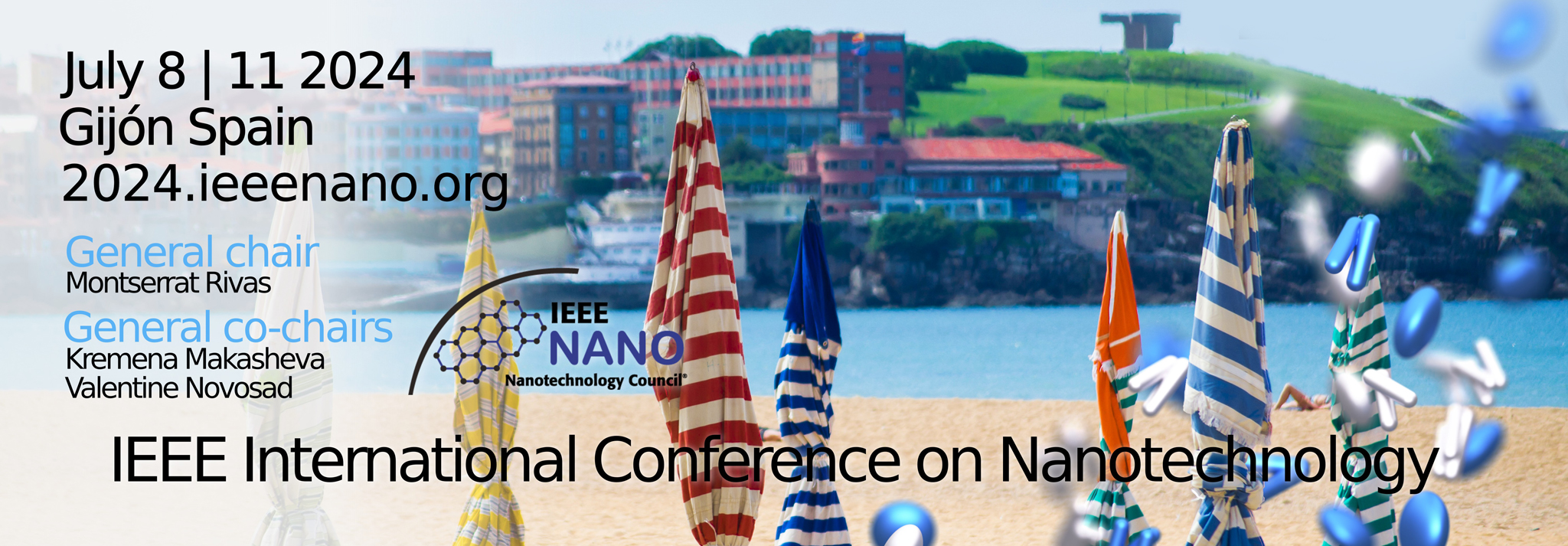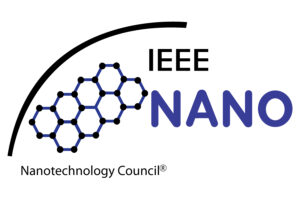
SPECIAL INVITED SESSIONS
This is the list of the Special Invited Session (SIS) proposals accepted to be part of the IEEE NANO 2024, which describes the latest and emerging scientific and technological research and activities in the fields of nanoscience and nanotechnology. Do not miss them!
Abstract
Wettability of nanostructured surfaces is a continuously growing field for advanced applications in liquid transport, microfluidics, sensors, or biomaterials. Among them, those with special wettability like superhydrophobic, oleophobic of icephobic surfaces are of special interest from an environmental (and economical) point of view, as they can present self-cleaning, anti-fouling, anti-fogging, anti-icing, or water-oil separation among other properties. These properties significantly reduce the maintenance of these materials, with the consequent reduction of water consumption, detergents or even more severe interventions. Fundamental properties such as chemistry, topography or surface energy are critical for the control of the water-surface interaction at the nanoscale.
Abstract
This special session on Silicon Photonics strives to offer insights into both current achievements and future breakthroughs in photonic devices, materials, and applications. Additionally, it will cover innovative approaches to monolithic and heterogeneous integration, along with advanced fabrication technologies specifically tailored for silicon and silicon related platforms.
Abstract
Nanophotonic and plasmonic structures and devices have emerged as pivotal tools in the realm of a broad spectrum of applications in optical sensing, displaying, quantum systems, and optical communications, revolutionizing the landscape with their unique ability to manipulate light-matter interactions. These nanoscale structures manipulate photons in unique manners or harness the interactions between photons and analytes, facilitating ultra-sensitive detection of minute changes in their surroundings. By exploiting nano-scale interactions, such devices enhance the performance of existing devices or enable new devices to be developed, which holds promise for diverse applications.
Abstract
Optical computing and communication represent a paradigm shift in information processing, leveraging photons instead of traditional electronic signals. Harnessing the speed of light, optical computing employs photons to perform computational tasks, promising faster and more energy-efficient operations compared to conventional electronic systems. Simultaneously, optical communication utilizes light waves for high-speed data transmission, overcoming bandwidth limitations. This transformative approach seeks to revolutionize computing and communication by capitalizing on the inherent advantages of optics, potentially enabling unprecedented data processing speeds and efficient information exchange in fields ranging from data centers to telecommunications, driving innovation towards a faster and more interconnected digital future.
Abstract
The convergence of biology, information science, and nanofabrication/integrated circuit technology is poised to profoundly affect the nature of human existence. As research in nanotechnology extends its tools for miniaturization and integration to nanometer dimensions, new vistas in biology and electronics are revealed, which require new multi-disciplinary approaches to both research and education. In this context the development of powerful modeling tools for the investigation of the interface between biology and solid-state materials is of utmost importance for achieving progress in the field. This special session on Ion and Electron Transport in Bio-nanostructures addresses a few issues on comprehensive modeling of the interaction between biomolecules and solid-state electronic systems.
Abstract
As we know, traditional Moore’s Law scaling is approaching its physical limits but the appetite for higher performing systems is ever increasing. The potential for more capable systems with higher yields is driving suppliers in HPC, graphics, and AI/ML systems from monolithic dies to chiplet architecture. While chiplet architectures offer various benefits, they also pose several challenges for successful implementation and widespread adoption in meeting demands of increasingly complex and diverse applications. A huge amount of work is in progress among players in the Chiplet ecosystem to come up with solutions to these challenges.
Abstract
The session focuses on research activities in both academic and business domains within the territory where the conference is being held. Following an initial presentation on the role of neuro-morphic techniques in the area, three articles delve into the analysis of solutions at the device level, associative memory, and applications. Finally, two more scientific papers showcase results of ultra-low power consumption application in open RISC-V architecture types.
Abstract
Brief session synopsis – Semiconductor device fabrication works beyond the nanoscale. Advanced processes display angstrom-level variations that impact device performance and manufacturing viability. However, diagnostics used to guide device fabrication are often blind to important process variations. Traditional design of experiments has prohibitive time and resource costs. Advanced simulation techniques, encompassing both first principles and phenomenological methods, can peer through metrology limits and boost both experimental and fabrication capabilities. This Special Session will showcase a wide variety of academic and industry simulation contributions encompassing the state of the art in the field, running the gamut of both simulation methods and complementary experiments.
Abstract
This session on Field-coupled Nanocomputing (FCN) transcends traditional boundaries, uniquely covering the full stack of FCN expertise. It’s not just about individual topics; it’s a rare convergence of disciplines essential for FCN – from nanoscale fabrication and CAD to molecular modeling, information flow control, and design automation software tools. Typically, such knowledge is scattered across various fields, but here, we bring together stakeholders from all these domains. Prof. Wolkow, Prof. Walus, Prof. Graziano, Prof. Neto, and Prof. Wille will collectively offer an unprecedented, holistic view of FCN, making this session a pivotal moment in unifying and advancing the field.
Abstract
Abstract
Abstract
Abstract
In response to the growing demands for more memory and computing power in the Era of Big Data and Artificial Intelligence, emerging memory and computing technologies have become an active area of research. This special session explores the cutting-edge developments and advancements on energy-efficient memories and computing. These innovations offer solutions to scalability challenges, improving power efficiency, speed, density, endurance, data retention, and cost-effectiveness. Looking ahead, this special session not only aims to present state-of-the-art research on energy-efficient memory and computing but also to spark discussions on future directions, promoting continued exploration and innovations.
Abstract
Currently, the environment, energy and communications are critical applications that concentrate most of the commercial and research efforts for rapid technological optimization. Although often ignored, there is a growing need for devices and materials, which can operate away from standard conditions. These conditions can include extreme and hostile environments ranging from: oceans and deserts, for wind and solar energy; communications, observation and
research based on space platforms; or for wastewater treatments under aggressive corrosion and biofouling.
This special session will focus on the behavior and proposals of nanodevices and functional nanomaterials under/for extreme conditions, which may include Cryogenic and High Temperature, Irradiation by electrons, ions, neutrons and atomic oxygen, as well as at mechanical and corrosion extremes.
Abstract
Abstract
This session invites active scholars to present the state-of-the-art research and development on 0-2D materials and their innovative nanoelectronics such as flexible or wearable transistor, photodetectors, memristor and other devices. The scope of this session also broadly involves the new device applications, circuits design and system integration by the frontier progress of 0-2D materials and devices emerging with CMOS technology.
Abstract
Mechanical to electric power conversion plays a key role in the industrial revolution and social development. Recent advances in the field have revealed the new capability of mechanical to electric power conversion through novel approaches for applications in micro/nano electric generators and self-powered sensors.
In this special invited session, several highly active scientists will present their latest achievements in the fundamental research and device applications in tribovoltaics, triboelectrics and metal/semiconductor mutual interactions. In addition, the perspectives in the field will be shared by the invited speakers.
Abstract
Abstract
2D materials have been dominating the material science research of the past two decades. The extraordinary photoconductive properties of 2D materials have inspired the fabrication of a new class of extra-thin photodectors, suitable for flexible and wearable optoelectronics, photovoltaic cells, etc.
The scope of this Special Session is to gather research on the recent advances in the understanding of the photoconductivity in 2D materials and their exploitation in new class of optoelectronic devices. This is a hot topic of worldwide interest as photoconductivity is used to empower devices which are daily used for imaging, security, and monitoring.
Abstract
Assemblies of nanoscale electronic and computational elements offer the possibility for advancing Neuromorphic Electronic Devices. Apart from bioinspiration, such devices could address limitations of present day conventional electronic devices and chips such as high energy consumption. This session brings together an interdisciplinary group of researchers from chemistry to electrical and biomedical engineering to discuss advances in the field. Talks from experts in the field will detail advances in nanoelectronic particles, assembly approaches, natural and synthetic brain organoids, modeling, and computing paradigms.
Abstract
Magnetism is a ubiquitous part of modern and future nanotechnologies, spanning from motors and generators, through sensors and medicine, into information technologies and quantum devices. This invited session brings together several leaders in the community of magnetic nanotechnology, where they will present the current state of the art, opportunities and challenges in magnetic nanotechnology.
Abstract
Large-scale techniques, such as neutron and X-ray scattering, spectroscopy and imaging, and muon techniques have advanced in leaps and bounds over recent years, providing new insights into nanoscale systems. With upcoming advances in these facilities – including coherent X-ray sources, new higher flux neutrons, and new control of low-energy muons – the techniques will only become more insightful. This invited session brings together leaders in these communities
to share some of the cutting-edge advances in these tools, highlight some of the impacts they have had on nanotechnology, and present some of the opportunities available to the nanoscale science and engineering community.
Abstract
Soft electronics is envisioned as the future of next-generation electronic devices where devices can be readily deployed in various environments and scenarios, such as on-body, on-skin, biomedical implants, sensors, robotics, agriculture, etc. The recent advancements in nanotechnology has particularly spurred the advances of soft electronics in many aspects. A plethora of nanomaterials (e.g. nanoparticles, nanotubes, nanowires, graphene, 2D materials, etc.) have played a key role in soft electronics. This session will bring together researchers to foster knowledge exchange and promote discussions on the recent development and future of nanotechnology for soft electronics and related topics.
This is the second time we are proposing this special invited session, following the success of last year. This year we focus on invited speakers from Europe and other regions that were not extensively covered last year.”
Abstract
Semiconductor qubits present a scalable platform for future quantum computers utilizing fifty year progress in advanced logic fabrication and development. Both electron and hole quantum dots can be utilized in various encodings as a unit of quantum information – qubit. This session discusses expected quantum performance and limitations for each platform. The talks from Prof. Guido Burkard, and Dr. Maximilian Rimbach-Russ in the first part of this session discuss the
many body physics of these systems and nonidealities which limit the quantum gate fidelity in a few electron regime. Dr. Andre Saraiva addresses this physics for multi-electron quantum dots. Prof. García-Abadillo Uriel discusses the hole spin manipulation under realistic electric and strain fields. Prof. Gerhard Klimeck opens the second part of our session with a review of quantum theory which includes atomistic effects in these devices introducing the theme of the second part of our session which focuses on key electronic structure parameters and device variability. Prof. Daniel Loss discusses the impact of strain in alleviating energy degeneracy
valley splitting challenge for electron Silicon qubits, and Dr. Roza Kotlyar discusses the effects of electrostatics on this key parameter for Si/SiGe quantum dots. Talks by Dr. Biel Martinez and by Dr. George Simion focus on device variability, its characterization and mitigation for electron and hole qubits.
Part I theme – many body physics of qubit systems and control methods to achieve high performance fidelity.
Part II theme – is focus on atomistic and tcad modeling of key device metrics, and on challenges and sources of device variability.
Abstract
The scientific community and industry have worked hard over the past ten years to modify nanodevices, nanocircuits, and nanosystems with the goal of ushering in a new era of technology that will revolutionize the field of nanotechnology and enhance human welfare like never before. As a result of new disruptive nanotechnologies that go beyond CMOS, such as spintronics, molecular, superconducting, and DNA, to mention a few, at the lowest device level, computers that use devices smaller than 10 nanometers and take nanocircuit design considerations into account, are becoming more and more common. This is known as
nanocomputing!
More precisely, significant advancements in research have led to the inevitable movement of present CMOS technology scaling toward atomic bounds, virtually indicating the end of Moore’s era. In order to create disruptive nanotechnologies and fabricate multifunctional devices that can advance all facets of nanocomputing and related technical methods, efforts are being undertaken to find innovative materials. These factors have at all levels given rise to entirely new computing paradigms in technology, including bio-inspired, neuromorphic, molecular, approximation, stochastic, and probabilistic. It should be mentioned that in order to guarantee that computation at the nanoscales may be effectively carried out along such unconventional venues, these technological paradigms demand the physical basis (so devices) as well as efficient implementation and fabrication frameworks (from circuits to modules).
This workshop aims to showcase the latest research findings on cutting-edge technology for the creation and use of fresh approaches to nanocomputing. It will offer a special venue for debating the most recent findings in the vast field of nanocomputing science. This study could lead to the design and implementation of circuits, sensors, and processors in the future that operate better than those found in the state-of-the-art. The proposed nanocomputing-centered scientific forum will host contributions from exceptional international experimentalists, engineers, and designers with the aim of enriching the 24th IEEE International Conference on Nanotechnology 2024 (IEEE NANO 2024) program with a comprehensive overview of the latest technological achievements in this multidisciplinary research field. This will present a unique opportunity to exchange ideas, share knowledge, identify open issues, and propose future research directions across a wide number of different areas, from material engineering, to device physics, from circuit and systems, to circuit design and architecture.


